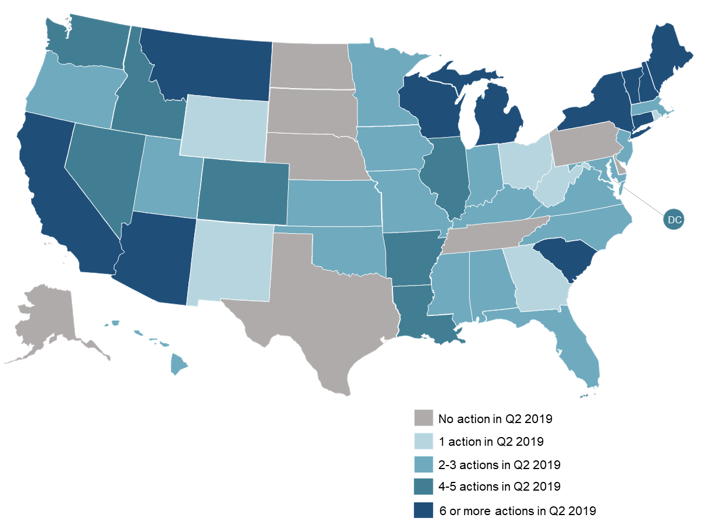The 50 States of Solar: 42 States and D.C. Took Action on Distributed Solar Policy and Rate Design During Q2 2019
Raleigh, N.C. – (July 24, 2019) The N.C. Clean Energy Technology Center (NCCETC) released its Q2 2019 edition of The 50 States of Solar. The quarterly series provides insights on state regulatory and legislative discussions and actions on distributed solar policy, with a focus on net metering, distributed solar valuation, community solar, residential fixed charges, residential demand and solar charges, third-party ownership and utility-led rooftop solar programs.
The report finds that 42 states, plus the District of Columbia and Puerto Rico took some type of distributed solar policy action during Q2 2019 (see figure below), with the greatest number of actions relating to net metering policies, residential fixed charge or minimum bill increases, and community solar policies.
A total of 172 distributed solar policy actions were taken during Q2 2019, with the greatest number of actions taken in California, Michigan, Arizona, Arkansas, Montana, New York and South Carolina.
Q2 2019 Policy Action on Net Metering, Rate Design and Solar Ownership

The report identifies three trends in solar policy activity taken in Q2 2019: (1) state undertaking studies to guide net metering successor tariff development, (2) utilities withdrawing proposals to adopt additional fees for solar customers, and (3) states establishing longer transitions to net metering successor tariffs. State legislatures considered over 150 bills related to net metering, rate design, and solar ownership policies so far in 2019, with 20 bills being enacted so far.
“The second quarter of 2019 brought busy legislative sessions to a close for all but a handful of states,” observed Brian Lips, Senior Policy Project Manager at NCCETC. “Policymakers in several states enacted distributed solar legislation, with net metering successor tariffs being a major issue addressed.”
The report notes the top five policy developments of Q2 2019 were:
- South Carolina legislators unanimously passing a net metering extension and successor bill;
- Connecticut lawmakers delaying the state’s net metering successor tariff transition;
- The Michigan Public Service Commission approving new distributed generation tariffs for DTE Electric and Upper Peninsula Power Company;
- Idaho Power and PacifiCorp proposing major net metering reforms; and
- We Energies proposing, and later withdrawing, an additional fee for solar customers.
“The number of states considering major net metering reforms is continuing to increase, but the approaches are shifting,” noted Autumn Proudlove, lead author of the report and Senior Manager of Policy Research at NCCETC. “We’re seeing a number of states establish a slower transition process and place a greater emphasis on data, studies, and stakeholder engagement.”
View the 50 States of Solar Q2 2019 Executive Summary
View and Purchase the 50 States of Solar Q2 2019 update FULL Report
View other 50 States Reports – Solar, Grid Modernization and Electric Vehicles
ABOUT THE N.C. CLEAN ENERGY TECHNOLOGY CENTER
The N.C. Clean Energy Technology Center, as part of the College of Engineering at North Carolina State University, advances a sustainable energy economy by educating, demonstrating and providing support for clean energy technologies, practices and policies. It serves as a resource for innovative, sustainable energy technologies through technology demonstration, technical assistance, outreach and training. For more information about the Center, visit: http://www.nccleantech.ncsu.edu. Twitter: @NCCleanTech